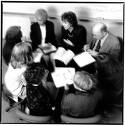
Our Lord did not command us to make disciples by teaching people to “know” his commands. He commanded us make disciples by teaching them to obey his commands (Matthew 28:19-20). Unfortunately, I have attended many Sunday School sessions that failed to deliver here. Frequently, the teacher simply did not prepare well. Often the teacher attempted to teach too much. You see, application takes time. Many lessons rush or ignore completely responding to God and run out of time to do something about the lesson (obedience).
How can we cooperate with God to craft lessons which lead not only to learning but also to action, to obedience? Obviously, we never want to underestimate the power of prayer in our preparation. Pray for the students. Pray for the lesson. Pray for lives to be changed. Teachers should begin with a personal encounter with God in Bible study–this is more than simply preparing a lesson. Meet God and seek to lead students to do the same. After all, it is God who has the power to change lives!
In addition, I want to offer four suggestions that can help move learning in the direction toward action. They come from an online article entitled Fink’s Five Principles of Good Course Design. (The article’s fifth suggestion has to do with grading.) The four suggestions from the article that I want to share are in all capitals followed by my commentary:
-
CHALLENGES STUDENTS TO HIGHER LEVEL LEARNING.“Lower level” learning includes simply making an information dump. It is what happens in many classes. Many lessons fail to accomplish more than learning “about” the Bible and Bible times. We want to stretch students beyond simply understanding what the Bible say. Memorizing scripture is not bad, but it is always more meaningful when a person understands the passage and applies it to his/her life. As the article suggests, the best lessons will include some “higher level” learning that includes “problem solving, decision making, critical thinking, and creative thinking.” For example, a teacher might ask, “How could Jim handle this problem by applying this passage?” Or, “What could we as a class do to meet this need in our community?” Or, “Having encountered God’s truth in this passage, what does He want you to do as a result of the encounter? What’s next?” Or, “Last week we studied God’s Word and discovered that God wanted _________. What did you do about it this past week?”
-
USES ACTIVE FORMS OF LEARNING. Every Bible study session will likely involve some “passive” learning: Bible reading and listening. But the best Sunday School teachers will do more than lecture. They will seek to engage the learners in the encounter with God and in the learning experience. These teachers seek to address the learning styles of participants. They engage them verbally, visually, and actively. They engage mind and body. They know that after 72 hours, retention is only 10% of what is read, 20% of what is heard, 30% of what is seen. But if the teacher can lead them to become more engaged, retention increases to 50% of what is seen and heard, 70% of what is said, and 90% of what is said and done! I like what the article said, “One learns to solve problems by solving problems; one learns to think critically by thinking critically; etc.”
-
GIVES FREQUENT AND IMMEDIATE FEEDBACK TO STUDENTS ON THE QUALITY OF THE LEARNING. We all like to know we are not wasting our time. Class attenders need to know if they are understanding what they are learning. They need to know whether their attempts at application and obedience are heading in the right direction. Plan into every learning experience time and opportunity for asking questions and checking on thinking and progress. Don’t wait until the next session to see if they got it.
-
USES A STRUCTURED SEQUENCE OF DIFFERENT LEARNING ACTIVITIES. There is a healthy balance between structure and variety. In order to keep and hold attention while leading toward learning and action, both are important. If you don’t get their attention, they will miss learning. If they don’t see the lesson applying to them, they will mentally check out. And yet learning methods should be used with purpose not just for the sake of variety. Build on what they know. Help them to understand the progress they are making. Help them to be comfortable with your sequence while not bored with it.
Pray. Meet God. Lead students to meet God. Move them to higher level learning. Get them active. Give them feedback. Balance structure and variety. Lead them to learn and apply. Lead them to obey. Be revolutionary!
Leave a Reply